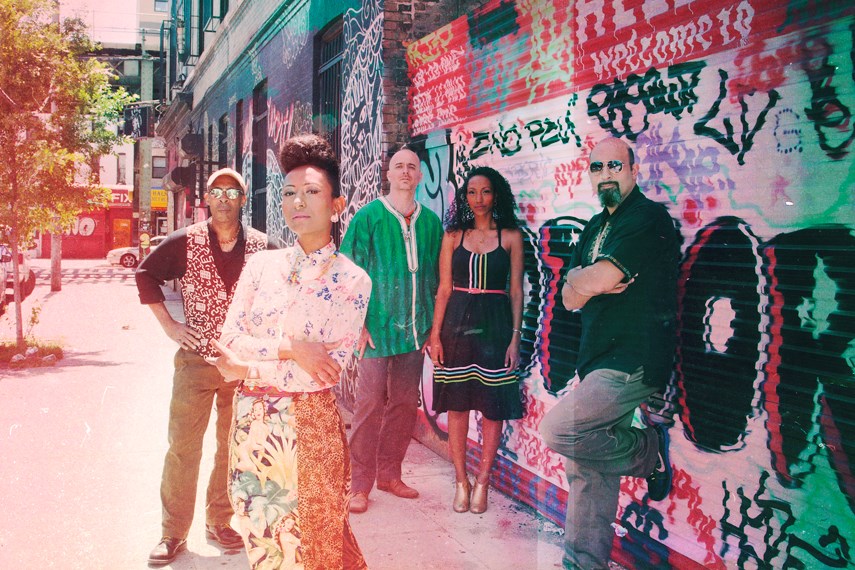Alsarah & the Nubatones, St. James Hall (3214 W. 10th Ave., Vancouver), Sunday, April 14 at 8 p.m. (capilanou.ca).
There’s more than music on singer Alsarah’s mind right now.
For more than 100 days, protesters in Sudan have being campaigning against the rule of long-serving President Omar al-Bashir, whose regime stands accused of crimes against humanity and a host of other disgraces which span its 30-year reign. Recently, a video surfaced of a woman leading anti-government chants during protests in the Sudanese capital of Khartoum. She’s been dubbed by many as “Kandaka,” which means Nubian queen, for her pose and candour in the face of fierce opposition – and she’s gone viral. And according to media around the world, the protests, which have been going strong since December, are escalating every day.
“I’ve been deep in the world of Sudanese Twitter following hashtags,” admits Alsarah, a Sudanese singer based out of New York City. “I feel like I’ve been writing these songs for this revolution since I started making music, songs like ‘Fugu’ and songs like ‘Nar.’”

“Nar,” a march-for-freedom-style protest song, is one of many such tracks on Alsarah’s and her band, The Nubatones, last album, Manara. A self-proclaimed practitioner of what she dubs “East African retro pop,” Alsarah and The Nubatones are slated to perform at St. James Hall in Vancouver on Sunday.
She may hail from Sudan, but Alsarah’s artistic approach is firmly rooted in Africa, namely East Africa, she tells the North Shore News.
“My being in the States, and New York especially, gave me a different perspective on how I wanted to connect with Africa,” she says. “For me, it was about more of a pan-African approach as opposed to a separation approach, especially because in all of Africa you’re witnessing a collapse of borders that were made up in the 1800s but sold to people as if it was the way things always were.”
The Nubatones were born out of conversations between Alsarah and future bandmate Rami El Aasser some years back regarding Nubian “songs of return,” she explains, adding that those songs look at modern migration patterns and the cultural exchanges between northern Sudan and southern Egypt, an area of land that the Nubians – an ancient people that go back centuries and who built a civilization that flourished along the Nile – once occupied.
In the 1940s and ’50s a musical body of work was created, mostly by collections of Nubians living in large urban centres, which explored the theme of returning to a home that’s perhaps no longer there due to displacement and an ever-changing world. It was a concept that greatly appealed to Alsarah and company.
“The theme of it is about a return home, a home that is either in your mind or in a real place, and they lyrics are shaped around the geography of place – descriptions of palm trees, the water, the use of rhythms – but the theme of it is returning to a home that somehow in your mind you know you can’t return to, either because it’s changed or you’ve changed,” says Alsarah.
Growing up in Sudan, Alsarah describes her parents as “basically professional activists.” She grew up in a household full of intelligent discussions, alternative discourses, and a constant flow of Sudanese artists and writers making their entrances and exits.
In the early ’90s, the family fled to Yemen following civil unrest – and then when a brief civil war broke out in Yemen in ’94 the family came to the U.S. on “the drop of a hat.”
For the first many years living in the U.S., and going through “the trappings of the immigration system,” Sudanese and African music weren’t top of mind for Alsarah. But once she started college she was called, in a manner of speaking, back home – much like the “songs of return” she would later be infatuated with.
“I did my senior thesis in Sudan, a research project out there on Zār music – it’s a female-led sect and it deals with music and possession,” she says, adding she later became involved with a band playing taarab songs of Zanzibar and Kenya from as far back as the 1940s. “From there, my love affair with Sudanese music continued.”
As Alsarah and The Nubatones prep songs for an upcoming third album, continuing their sound which merges African influences, with blues, folk, and pop-dance rhythms, the singer reflects again on the recent political uprisings in Sudan and her band’s musical theme of attempting to capture the sound of home, whatever that may sound like.
“The way we grow and evolve through it can be beautiful. It’s just about how you accept your changes and how you guide them.”



